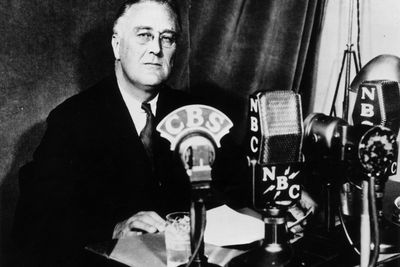It's My 100th Birthday. It's Been Quite a Century.
I grew up in the Great Depression and served in World War II. Trust me when I say America will survive this crisis, too.
By Arthur E. Rowse
Mr. Rowse is a retired journalist
New York Times, May 23, 2020.
There's nothing like reaching the age of 100 to make a person want to get a grip on life, to start looking for that elusive way forward, especially when it comes during a pandemic propelled by a devilish virus that is everywhere and nowhere.
For the big day recently, it was great fun to be distracted by honking cars of neighbors and friends parading by my nearly 97-year-old wife and me at our house in Chevy Chase, Md., while I was waving a wooden tennis racket that I think I swung as a kid. What was missing was the kissing and hugging as well as cake-cutting on the back deck.
After all, what is life if you can't freely enjoy it? Although there are some signs that the country is turning the corner on the way to beating this coronavirus, there are other signs that our bitter politics, our impatience with progress — from President Trump on down — could send all of us into an even deeper hole than we might imagine.
Of course, Americans have faced some tough tests before. For example, what could have been worse than the double whammy of both the Great Depression and World War II — after surviving the pandemic of 1918-19, which infected an estimated third of the world's population?
As a child in Lexington, Mass., I didn't realize I was growing up at one of the worst times in our nation's history. My parents were able to shield my brother, my sister and me from the worst effects of the Great Depression. But the sight of the bread lines in nearby communities was disheartening.
What did hit me was World War II, which arrived while the Depression was still devastating the nation. Almost every eligible man and woman entered the military service or a so-called defense industry. I wound up in uniform serving as a clerk in Italy with the Allied Control Commission, a joint British-American organization responsible for restoring provincial Italian governments as they were retaken from the Germans.
I was waiting to come home right after the European war had ended when I was notified that my brother had been killed three weeks earlier. He was a forward scout for Gen. George Patton's push across the Elbe River in Germany. He had sped up his courses so he could enlist months before the rest of his class's graduation.
My mother's heart was slashed forever. But she had the inner strength of her faith to not only cope but to thrive, especially as she attached herself later to my own children.
I was only 12 when Franklin Delano Roosevelt was elected president in 1932 and as I grew older, I began to secretly admire him despite my parents' opposition. My admiration only grew as he tamed the Depression and led the nation to victory in the war. If those tests were not enough, he fought a case of polio that might have defeated almost anyone else.
What helped the country survive the most, I believe, was his strong leadership qualities, his ability to win the support of the American people with progressive legislation that propped up the banks, put millions of jobless Americans to work on government and military projects, strengthened labor rights, established food stamps, regulated securities and set minimum wages.
He also took advantage of the relatively novel means of communication, nationwide radio networks, with his morale-building fireside chats in which he sold the war effort and his massive social programs. His deft use of radio greatly helped him provide the leadership necessary to win the war and restore the economy.
After the war I took up a career in journalism, starting as a cub reporter alongside a young Ben Bradlee at the dirt-digging Manchester, N.H., Sunday News. While a desk editor later at The Boston Traveler, I wrote "Slanted News," a case study of Republican political bias in covering the famous Nixon Fund of the 1952 campaign for president.
Later stops included The Washington Post and U.S. News and World Report, with a sideline in media criticism. So I've watched President Trump's abuse of the truth and exploitation of the media with a critic's eye.
It's instructive to contrast Mr. Roosevelt's record as a leader and communicator with that of President Trump. Mr. Trump, too, faces devastating problems with the coronavirus and its depressing effect on the economy. He also knows the value of communicating directly with the masses, especially with his 66 million Twitter followers.
Yet in their biggest battles, one became a paragon of hope and optimism, while the other has turned even more darkly negative and divisive than before the coronavirus disaster.
Despite all the bad news and political bitterness, I remain confident that we Americans will soon turn the corner against this invisible enemy. One big reason for that faith is that a young member of my extended family is on the front lines of the war against the coronavirus, as a newly minted doctor working at a hospital in Boston.
Another reason is the fact that nothing yet has been able to kill that famous American spirit that was triggered at Lexington in 1775.
I still need to blow out some candles, but this mask keeps getting in the way.
###
May 26, 2020
Voices4America Post Script. I thought this hopeful overview was a good way to begin the day, following a Memorial Day weekend, when we faced the loss of 100,000 of our fellow Americans. We mourn. We hope. We fight. #Blue2020
